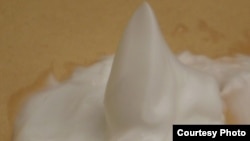Researchers have developed a moisturizing lotion with the potential to treat deadly skins cancers, psoriasis and promote diabetic wound healing. The cream's unique molecular properties were engineered using nanotechnology, allowing its active ingredients to penetrate deeply into the skin to switch off disease-causing genes.
Nanotechnology involves the manipulation of miniscule particles, 1,000 times smaller than the diameter of a human hair. The nanoparticles in the new lotion consist of nucleic acids of messenger RNA, a chain of genetic material designed to target the disease-causing genes in the skin cells.
Because these nucleic acids cannot get into cells in their normal linear form, researchers rearranged them into spherical structures. Then they organized the RNA spheres into a kind of densely-packed shell surrounding a gold nanoparticle.
Because these nucleic acids cannot get into cells in their normal linear form, researchers rearranged them into spherical structures. Then they organized the RNA spheres into a kind of densely-packed shell surrounding a gold nanoparticle.
The result was an object that could easily penetrate the deepest layers of skin cells and disable disease-causing genes responsible for conditions such as melanoma, a deadly skin cancer, and help the healing of diabetic foot wounds.
The gold in the structures allowed scientists to easily follow the movement of the nanoparticles.
Chad Mirkin, Director of the International Institute for Nanotechnology at Northwestern University in Illinois, developed the disease-fighting skin cream. Mirkin says the nanoparticle-containing moisturizer opens up the possibility of what he calls topical gene regulation. “And what that means is we can take disease cells and flip genetic switches that correct the disease or, in the case of even things like cancer, cause cancer cells to selectively die. And that’s really, really exciting because there’s no other game in town in that regard," he said.
Mirkin notes that at the same time they target disease-promoting genes, the so-called interfering RNA leaves the genes in the nuclei of healthy cells alone.
The nanoparticles were mixed in a thick, soothing cream called Aquaphor that can be applied directly to the skin. There, the cream enhances the skin's natural protective barrier to keep in bodily fluids, such as water, and keep out disease-causing molecules.
Amy Paller, head of Northwestern University's department of dermatology and its skin disease research center, worked with Mirkin on the cream. She says lab experiments in mice and with human skin samples showed the nanoparticles switched off a protein on skin-cell surfaces that’s important to how they function.
“Shockingly, there was almost no change at all in any genes we were not trying to suppress. We did not activate the immune system. So, we think we have a unique system that not only gets through the barrier and is taken up beautifully by cells and, to date doesn’t seem to have any problem," she said.
If the work continues to show promise, the genetic nanoparticle cream has the potential to selectively knock out genes responsible for a host of skin conditions.
The US government has licensed a company called Aurasense, founded by Chad Mirkin, to further develop the topical drug delivery system.
An article describing the nanoparticle skin cream is published in the journal Proceedings of the National Academy of Sciences.
